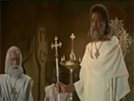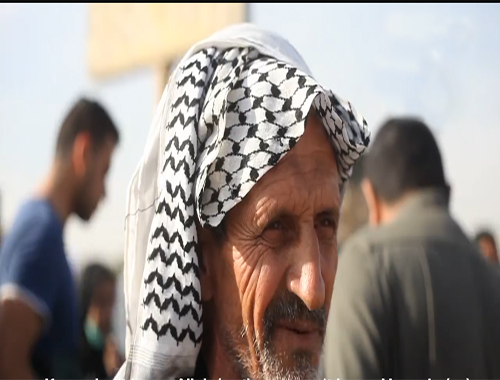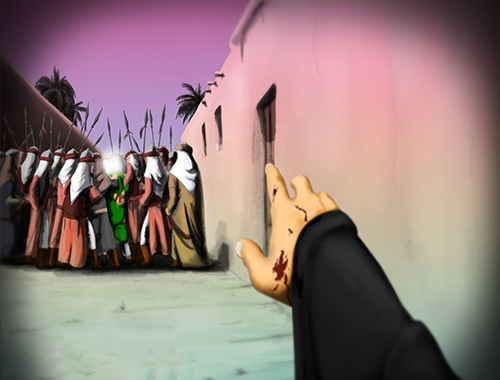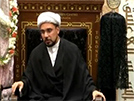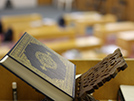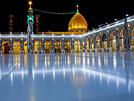Verses 6-14
- Details
- Hits: 2633
Sura Fajr
(Break of Dawn)
No.89 (Verses 6-14)
(6)أَلَمْ تَرَ كَيْفَ فَعَلَ رَبُّكَ بِعَادٍ
(7)إِرَمَ ذَاتِ الْعِمَادِ
(8)الَّتِي لَمْ يُخْلَقْ مِثْلُهَا فِي الْبِلَادِ
(9)وَثَمُودَ الَّذِينَ جَابُوا الصَّخْرَ بِالْوَادِ
(10)وَفِرْعَوْنَ ذِي الْأَوْتَادِ
(11)الَّذِينَ طَغَوْا فِي الْبِلَادِ
(12)فَأَكْثَرُوا فِيهَا الْفَسَادَ
(13)فَصَبَّ عَلَيْهِمْ رَبُّكَ سَوْطَ عَذَابٍ
(14) إِنَّ رَبَّكَ لَبِالْمِرْصَادِ
6. Have you not seen how your Lord dealt with the 'Ad (people), -
7. Of the (city of) Iram with lofty pillars,
8. The like of which were not created among (other) cities?
9. And the Thamood (people) who hewed out the (huge) rocks in the valley
10. AM Pharaoh - of the many stakes
11. "Who (all) transgressed in the land,
12. "And made much corruption therein,
13. "Therefore did your Lord pour on them a scourge of diverse chastisement:
14. "Surety your Lord is ever watchful.
Commentary:
"Your Lord is ever Watchful"
The following verses, contain some meaningful oaths about the punishment of the transgressors, of which a few powerful ancient nations are referred to; each of which had great authority in their own right, but were arrogant and went astray. They did not believe and disobeyed allah, and these verses illustrate their painful destiny to show the pagans of Mecca and other similar nations, who were probably much weaker than them, to understand their own status and awaken them from their neglectful sleep.
"Have you not seen how your Lord dealt with the 'Ad (people),"?
The term /tara/ 'see', here, means 'know or understand', but since the story of these sects were so clear and known to all, it seems that the people of later generations had also been able to see them with their own eyes. In this verse, of course, the addressee is the Prophet (p.b.u.h.), but, the warning is to all.
The 'Ad people with their prophet Hud, are, as some historians believe, mentioned separately in two groups: (1) the first lived in very ancient times and they are called in Qur'an /'ad - al - ula/ (the early generation of 'Ad) (Sura Najm, No. 53, verse 50) who probably used to live in prehistory, (2) a remnant from the former group, also known by the name 'Ad, existed during recorded history, which may be about 700 B.C., and lived in Ahqaf, Yemen at the southern end of the Red Sea. The people were tall and strong in stature and, likewise, were considered excellent fighters.
Moreover, they were very advanced in their material civilization, having lofty buildings in large cities with cultivated lands of verdant fields and luxuriant gardens.
Some others say that 'Ad is the name of an ancestor of the people, and a tribe was usually called by the name of its ancestor.
* * * *
"Of the (city of) Iram with lofty pillars,"
Opinions are divided about the name 'Iram' as to whether it is the name of a person or a sect or a city.
In Kashshaf, Zamakhshari cites, from some others, that 'Ad was a son of 'Aus (Uz), the son of Iram (A'ram), the son of Sham (Shem), the son of NUh (Noah). And since the name of the ancestor of a tribe was used for the tribe, the 'Ad people were also called Iram.
Still others believe that Iram is the same as / 'ad-al-ula/ (the early generation of 'Ad) and that 'Ad is the second group of people. Then, there are others who believe that Iram is the name of a city and the land where they lived,(1) and corresponding with the next verse, Iram is the name of their matchless city.
The term /'imad/ means 'pillar' whose plural form is /'umud/.
According to the first commentary it points to the strong pillar-like stature of the people of 'Ad; and taking the second commentary into consideration, it points to their great, lofty buildings with strong pillars, both of which illustrate the strength and the power of the 'Ad people, but the second commentary, i.e., the great lofty pillars of their buildings, is more appropriate.
* * * *
That is why in the next verse, it says:
"The like of which were not created among (other) cities?"
The sense, here, shows that the meaning of Iram is 'a city' and does not mean sect or tribe, and this may be why some great commentators have accepted that this is the correct commentary, and we have preferred it, too.
Some of the commentators have told long stories about the recent excavated beautiful, supposed city of Iram, in the deserts of Arabia, and the lands of Eden, speaking of its high, splendid buildings and its extraordinary jewelry. Of course, they seem more mythical or dreamlike than real.
There is no doubt, however, that the people of 'Ad were of the strongest and the most advanced people of their time and their cities were the best. As the Qur'an says, there was not any city like that among other cities.
There are many stories told about Shaddad, who was a son of 'Ad, and Shaddad's Paradise.(2) These stories are told by people and written in books so abundantly and frequently that 'his paradise' and 'the gardens of Iram' are used proverbially in the language, but they are all myths developed over time which have some roots in reality.
* * * *
Then, the Qur'an refers to the second group of transgressors of ancient times and says
"And the Thamood (people) who hewed out the (huge) rocks in the valley"
The Thamood were among the most ancient of people, and whose prophet and warner was Salih. They lived in a land between Medina and Damascus named /wadi - al - qura/ and had an advanced civilized life with comfortable houses and lofty buildings.
Some have said that 'Thamood' was the name of the father of the tribe and so, they took their name from him.
The term /jabu/ is originally from /jaubah/ which means 'low land', so,it is used with the sense of 'to split, cleave, or cut out any piece of land'. An answer is called /jawab/ because it cleaves the air when it comes out from the mouth of the speaker and reaches the ears of the listener, or because it carves out a question and puts an end to it.
In any case, here, it means cutting the rocks of the mountains and making safe and sound houses as Sura Hijr, No. 15, verse 82 says about the Thamood people: "Out of the mountains did they hew (their) edifices, (considering themselves) secure." Similar to this idea, it is also mentioned in Sura Shuara No.26, verse 149: "And you hew houses out of the mountains exultingly", but here the word /farihin/ 'exultingly' is an evidence to show that they lived with pleasure and were making merry in those houses.
Some have said that the Thamood were the first people who carved the rocks and produced firm houses inside the mountains for themselves to live in.
The term /wad/ , which was originally /wadi/, means 'river bed, or flood route' and sometimes it has been used with the meaning of 'valley' since the flood waters pass through valleys at the base of the mountains.
Here, the second meaning is more apt to explain the word, because as it is understood about these people, from the verses of the Qur'an and also from the above verse, they used to build their houses in the mountain sides to make safer living quarters.
A tradition from the Prophet (p.b.u.h.) says that on his way to the North of Arabia, riding on horse back for the battle of Tabuk, he reached the valley of Thamood, and ordered the others to make haste, because they were in a cursed land.(3)
Undoubtedly, the Thamood had an advanced civilization with grandiose cities in their time, but, the descriptions written about them are exaggerated and mythical. For example, some commentators have written that they had one thousand seven hundred (1700) cities all made of stone.
* * * *
Then, the third group is spoken about:
"And Pharaoh - of the many stakes"
The meaning, in the form of a question, is: 'Did you see what allah did to the Pharaohs who were powerful, but transgressed and were cruel?'.
The term /autad/ is the plural form of /watad/ which means 'peg or stake'.
The reason why Pharaoh was called /thi-'l-autad/ 'of the many stakes' has three different intepretations:
The first is that he possessed a large army, many of whom used to live in tents. The army tents were made firm and stable by using stakes.
The second is that Pharaoh persecuted those whom he hated by ordering that their hands and feet be fastened to the ground with stakes; or that they be laid on a piece of wood and their hands and feet nailed to it with stakes, and thereby confining them and leaving them to die.
This commentary is mentioned in a tradition from Imam Sadiq. (4) As it is understood from history, Pharaoh even persecuted and killed his wife, 'Asiyah, in the same manner, when she followed on the path of Moses and confessed the faith.
The third is that 'many stakes' means 'a large army camp ready to fight'.
Of course, these three interpretations do not contradict each other and all of them may be combined in the meaning of the verse.
* * * *
In conclusion, referring to the behavior of these three groups, it says:
"Who (all) transgressed in the land,"
* * * *
"And made much corruption therein,"
Corruption, which consists of any tyranny, transgression, cruelty and lust, was, in fact, one of the results of their disobedience, and any disobedient people will finally sink entirely into the depths of corruption.
* * * *
Then, in a meaningful, but short sentence, it points to the painful punishment of all those groups, saying:
"Therefore did your Lord pour on them a scourge of diverse chastisement"
The term /saut/ means 'a scourge' but orginally meant 'to mingle', then It has been used in the sense of 'a whip' (woven with strips of leather and the like). Some have resembled it to a kind of punishment which will be mingled with the flesh and blood of Man,and which causes him extreme pain.
Hazrat Ali (p.b.u.h.) says in one of his sermons: "By Allah who sent the Prophet (p.b.u.h.) with faith and truth, you will be severely examined as if vigorously shaken through a sieve, and thoroughly blended as if stirred in a cooking pot". (5)
The term /sabb/ originally means 'to pour water' and, here, it refers to the graveness and continuity of the punishment. It may refer to the clearing from the land of these disobedient ones. But, on the whole, from all the meanings of /saut/ the first one, i.e., 'scourge' is the most suitable. It is a term that is also used in current vocabulary.
This short statement illustrates the various chastisements which were cast on those groups of people. The 'Ad people were destroyed by a terrible blast of cold wind, as the Qur'an says: "And 'Ad, they were destroyed by a furious Wind exceedingly violent", (Sura Haqqah,No. 69, verse 6).
About the Thamood, it says: "But the Thamood, - they were destroyed by a terrible Storm of thunder and lightning!" (Sura Haqqah, No. 69, verse 5).
The Pharaoh and his men were utterly drowned in the Nile River: "... and We drowned them all", (Sura Zukhruf No.43, verse 55).
* * * *
Finally, as a warning to all, it says:
"Surely your Lord is ever watchful."
The term /mirsad/ is derived from /rasada/ which means 'lie in wait' and also 'an ambush, or a place of observation'. It is usually used for a place where persons have to travel through a pass in which someone is lying in wait to strike them. On the whole, it means that no one should think that he can escape from the divine punishment, because all are under His authority and Power and whenever He wills, He may administer His punishment.
It is obvious that Allah is not confined to a particular place and time and does not lie in wait in a pass, but, it means that His Power is over all transgressors, tyrants and sinners. On this subject, a traditon from Hazrat Ali (p.b.u.h.) says: "Surely your Lord is capable of recompensing the doers of sin for their evil deeds". (6)
A tradition from Imam Sadiq (p.b.u.h.) says: "/mirsad/ is a bridge on 'the Way over Hell' on which a person who has transgressed another person cannot pass.".(7)
In fact, the divine ambush is not limited merely to the Hereafter and that known passageway over Hell, it is also watchful of the transgressors in this world. The punishment cast on the aforementioned three groups of people is an illustration of this.
The term /rabbika/ 'your Lord' touches on the meaning that 'Allah ' law, for the punishment of the ancient, arrogant nations, is also true for every sect including one's own', which is a solace for the Prophet (p.b.u.h.) and the believers, both, to know that their spiteful enemies cannot escape from the wrath of Allah and the disbelievers should also know that those who are more powerful and miserly than themselves can be destroyed easily by a violent storm, a sound or even lightning. Then, by doing their wrong actions, how do they think that they can be saved from divine punishment?
In a tradition from the holy Prophet (p.b.u.h.), it says: " Ruh - al - Amin (Gabriel) informed me that at the time when Almighty Allah gathers, in the Hereafter, all creatures from the earliest ones to the latest ones, He will bring Hell nigh and set /sirat/ 'the way' over it. The way is thinner than a hair and sharper than a sword, and there are three bridges over it. On the first bridge honesty, grace and affection are waiting; on the second one, prayer; and on the third, Justice of the Lord of the worlds."
"All people will be ordered to pass over it, then those who had been dishonest and cruel will stop on the first bridge, and those who had been neglectful in their prayers will stop on the second bridge, and those who finally pass on to the third will be faced with the Justice of Allah. This is the meaning of (the verse:) 'Surely your Lord is ever watchful'".
In one of his sermons, Hazrat Ali (p.b.u.h.) says: "lf Allah has allowed time and opportunities to any tyrant, it does not mean that He has completely lost control over him. He can wait before bringing down His punishment which none can escape and no one can offer protection from it, not even death...".(8)
(1) Kashshaf Commentary, vol. 4, p. 747, and Qartabi also narrated this idea in his commentary.
(2) Hayat-al-Qulub, vol. 1, p. 107.
(3) Ruh-al-Bayan, vol. 10, p. 425.
(4) Nur-uth-Thaqalayn, vol. 5, p. 571, Tradition, 6; 'Ilal-ush-Sharayi'.
(5) Nahj-ul-Balaqa, Sermon 16 (Arabic Version).
(6) Majma'-al-Bayan, vol. 10, p. 487.
(7) Majma'-aI-Bayan, vol. 10, p. 487.
(8) Nahj-ul-Balaqa, Sermon 100, (Arabic Version).

